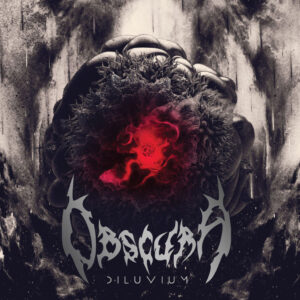I’ve written about Obscura quite a lot in recent times. Largely because I’m an unapologetic fanboy of both the artist and the genre but also because the band has sat atop their throne of tech-death carcasses for about ten years now, occasionally pulling bits of Archspire and Rings of Saturn out of their teeth with a toothpick fashioned from discarded hacksaw blades. The Germans blasted their way onto the international stage with Cosmogenesis in 2009 and swept the world away by filling the gap in modern European Tech-death abdicated by Necrophagist, whilst including more progressive and melodic elements akin to Cynic and later Death releases that the aforementioned titan.
Diluvium marks the fourth and final part of Obscura’s cycle of evolution and philosophy, and as a result has a lot to live up to. It also marks the first appearance of guitar wizard Rafael Trujilo (despite being present through the previous album tour cycle and press packages) after the heavily controversial dismissal of Tom Geldschlager prior to the release of Akroasis; a topic that adding fuel to would be akin to throwing cigarettes at an Australian wildfire. Without beating around the bush with snarky remarks and extended metaphors, I’d like to announce that Diluvium is good. It’s the culmination of ten years of experimentation and a lifetime of drawing influence. It pays homage to those to whom it owes its character without aping, yet is individual in its own execution to make it a unique and interesting outing.
Diluvium from the start has everything you would expect from an Obscura album. Saying that the musicianship in flawless is like saying the sky is blue, and that the individual performances showcase the best that technical death metal has to offer is like saying that I’m drooling from every orifice praising this record. Rafael Trujilo’s glitchy yet smooth edged lead work flips between effortlessly spastic to noodly and intricate, into melodic and catchy from moment to moment. Linus Klausenitzer’s bass work is Individual Thought Patterns on steroids and remains driving yet fluid and loose, and Sebastian Lanser’s drumming is unrivalled and honestly staggering; his use of dynamics and jazz influence prevalent and captivating.
What sets Diluvium apart from other Obscura releases and other contemporary tech-death artists? It’s songwriting, dynamics and variety. Looking at the liner notes for the album it looks to be a more collaborative effort which has more than paid off. Each track is coherent and memorable; combining ear shattering technicality with soothing melody, eerie ambience and bone shattering heaviness; each idea flowing effortlessly from one part to the next.
But it’s the dynamics and individual character of each song that makes Diluvium so strong, and the way that the band combine so many ideas and influences into a cohesive while is admirable, while also cherry picking the best ideas from their own back catalogue. “Clandestine Stars” sounds like something off of Cosmogenesis as performed by Symbolic era Death. “Emergent Evolution” is pure unadulterated Cynic worship with its vocoder use and spacey leads. The stop-start glitchy nature of the titles track is catered more towards your younger metal crowd brought up under the djent movement but still remaining firmly in the Euro-tech zone. “Mortification of the Vulgar Sun” most closely resembles the Akroasis body of work, whilst album highlight “Ethereal Skies” combines eye-watering complexity with epic chorus’ and symphonic section straight from Septicflesh’s Titan and a solo that sounds like the result of shutting Protest the Hero in a cupboard with a copy of Into Eternity’s Buried in Oblivion for nine days with nothing but pop-rocks for sustenance. “The Conjuration” sounds like At the Gates in a blender while “Convergence” and “The Seventh Aeon” are bringing out the full Euro-melodeath vibe. “Ekpyrosis” and “An Epilogue to Infinity” are almost the odd ones out for more closely resembling Obscura’s other work; pulling out all the weird technical interludes found on Omnivium. While it sounds like I’m just comparing Diluvium to the band’s influences (which is somewhat inevitable) it’s not to detract from the band’s own input and execution of the work. It’s knowledge of the source material over just handing in the dictionary as your dissertation.
The spattering of melodic vocals, ambient sections, acoustic interludes and symphonic breaks add to this already jam packed outing and add further dimensions to each track. It’s also worth noting that this is Obscura’s musically darkest outing, owed largely to the outstanding dynamism and elements more often included in moodier, more atmospheric and brooding strands of death metal, aided by muddier and more claustrophobic production than then techier modern vibes from Akroasis.
At the end of the day it’s the enjoyability of Diluvium that makes it’s so damn good. It’s overlaying narrative and blistering unpredictable musicianship makes for never a dull moment. After a frankly embarrassing number of repeat listens I keep finding new things to love about this album. It inspires me to improve my own songwriting chops and Obscura songs will never not be a fun and challenging endeavour to learn on guitar.
In short, despite the quick turnaround between records, Obscura have created a record that will sit atop the tech death throne for some time, brimming with intricate subtlety and unadulterated brilliance. This is what progressive death metal should sound like in 2018.
10/10




